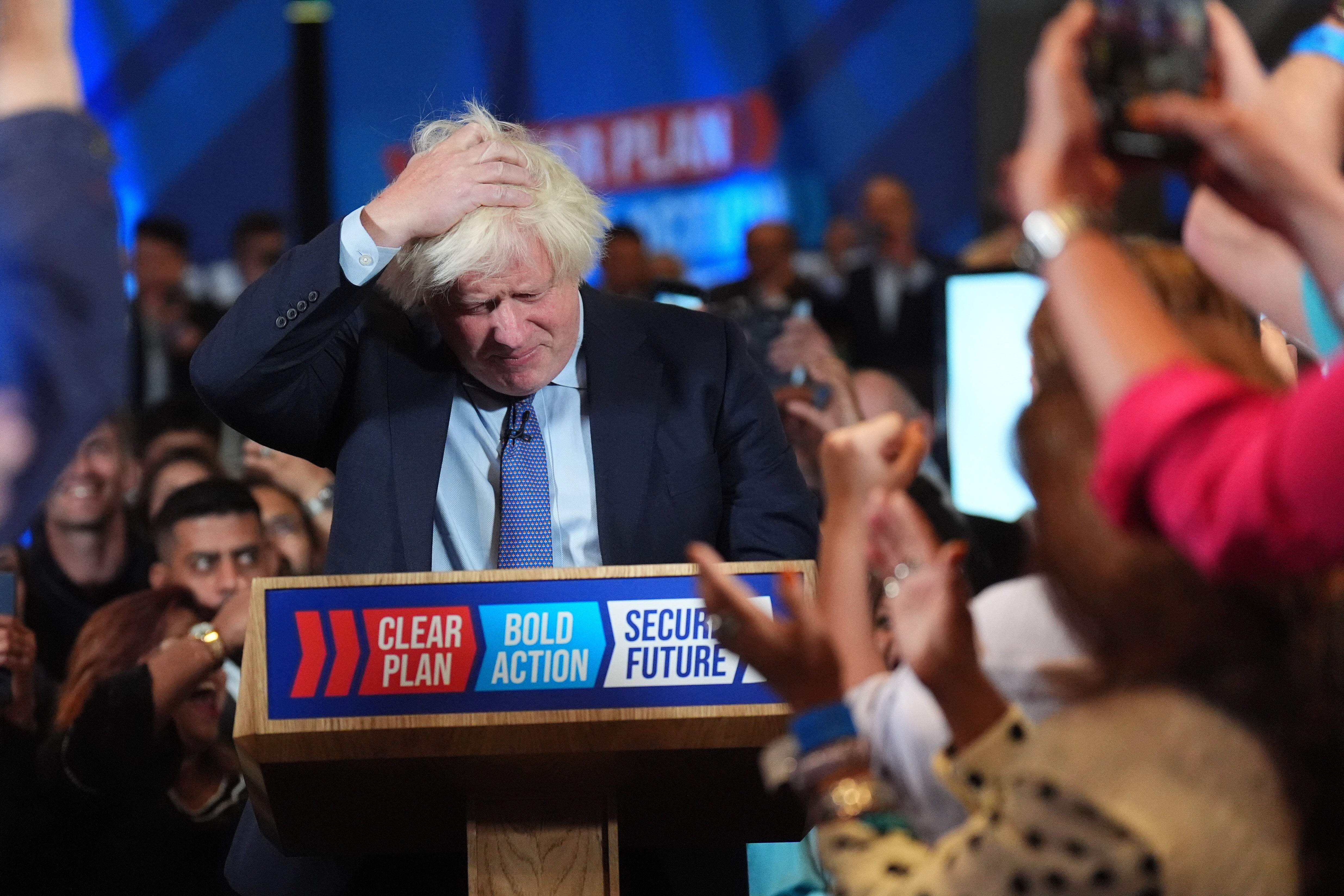This is what Boris is really up to (Hint: it’s not supporting Sunak...)
The former PM’s 11th-hour intervention had little to do with party loyalty, and everything to do with settling his own unfinished business, writes Andrew Grice


Boris Johnson’s surprise last-minute appearance at a Conservative election rally in London was not a sign of the party’s strength or unity, but a reminder of its weakness, divisions and sheer desperation.
The Tories, who could once claim the mantle of the “natural party of government”, are fighting to ensure that they, rather than the Liberal Democrats, become the opposition. They are so desperate that, for the past week, they have stopped talking about their own offer – all they have left is to warn people about a Labour “supermajority” in the hope of preventing one. Mel Stride, the work and pensions secretary, plumbed new depths today with a ludicrous claim that Labour’s majority could be bigger than the 492 won by the coalition national government in 1931.
Rishi Sunak pressed the panic button by turning to the man who won a majority of 80 in 2019 and thought he had won himself 10 years in Downing Street. After tense negotiations between their two camps, Johnson insisted he would appear at an event only if Sunak pleaded with him personally.
Johnson still blames Sunak for his downfall. Wrongly: I believe Sunak resigned as chancellor because he could not stomach Johnson’s casual relationship with the rules and the truth any longer. The architect of Johnson’s demise was himself.
Johnson declined to appear at the rally at the same time as Sunak, who spoke after him – and, embarrassingly, got a much less ecstatic response from the Tory activists, who cried: “Boris! Boris! Boris!” It merely reminded us that they have never felt the same about Sunak. “He made Sunak look like his research assistant,” one Labour wag told me.
Sunak’s claim that Johnson’s appearance showed that “our Conservative family” is “united” was stretching it. There was no pretence of unity with a handshake or slap on the back, and Johnson couldn’t even bring himself to mention the prime minister. Johnson acknowledged the “differences” in their party, but insisted that they were trivial when compared with the threat of a Labour “sledgehammer majority”.
His attacks on Keir Starmer and Nigel Farage – “Don’t let the Putinistas deliver the Corbynistas” – might push a small number of the estimated one in eight “don’t knows” into the Tory column. Some 55 per cent of the undecideds were Tory voters in 2019, and many of them are women, according to More in Common. Tory supporters who have switched to Labour prefer Sunak to Johnson, but those who have moved to Farage’s Reform UK or are “don’t knows” prefer Johnson.
If Johnson’s re-emergence reminds other voters of Partygate, his lies, and why they want to kick the Tories out, Sunak won’t mind too much, because such people will not back the Tories tomorrow. Scrambling a relatively small number of Tory votes might save a few marginal seats.
Yet I suspect Johnson wields a double-edged sword. He is unpopular among liberal Tories in the blue wall in the South, and the red wall seats in the North and the Midlands that he won in 2019 are probably already lost.
Johnson might inadvertently help Labour by underlining its final-day message to voters not to forget that the Tories believe in “one rule for us, another for everyone else”. He is the personification of that. Starmer might persuade progressive voters who think the election is a done deal to back his party rather than the Greens (as Labour genuinely fears some will – its jitters on this front are real).
Johnson belatedly came to the aid of his party because it suited both him and Sunak. Inevitably, it was mainly about himself. It always is. If he had restricted his election effort to filming videos supporting several Tory candidates from his holiday in Sardinia, that might have damaged him in a future leadership contest. He now has an insurance policy against a charge of disloyalty.
His move is a sign, not that he has forgiven Sunak, but that he wants to lead his party again, and to complete what he calls his “unfinished business” at Downing Street. He sees himself as the only one who can save the Tories from Farage.
Johnson’s 11th-hour appearance is a “win, win” for him. If the election result is less bad than the opinion polls are predicting, he will not be slow to claim the credit. If the wipeout suggested by the polls happens, it will all be Sunak’s fault anyway.
The Tories’ relief at Johnson’s intervention didn’t last long. Remarkably, Suella Braverman declared the election over and told the party via The Daily Telegraph to “prepare for the reality and frustration of opposition”.
The former home secretary jumped the gun – just as she did by launching her previous leadership bid before Johnson had resigned – to be quick out of the traps in order to further her own leadership ambitions. It didn’t work then, and it won’t help her chances in the next contest, either.
However, Braverman is right about one thing: the coming “fight for the soul of the Conservative Party” will decide whether it “continues to exist at all”.






Join our commenting forum
Join thought-provoking conversations, follow other Independent readers and see their replies
Comments